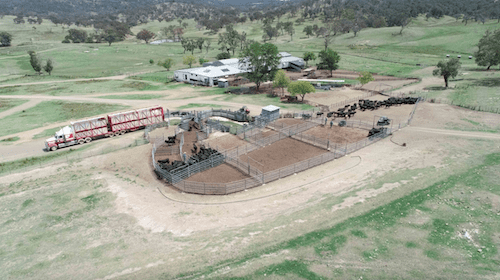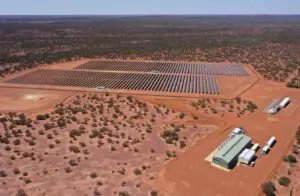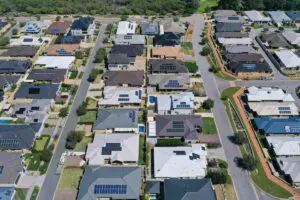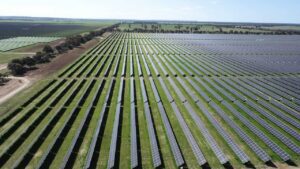Origin Energy has bought a 7690-hectare sheep and beef property in New England, just as a new wave of opposition ramps up in the region against renewable energy infrastructure.
The company bought the Warrane farm for, reportedly, significantly more than the $35 million ticket price.
But the move to buy land, as opposed to the usual strategy of leasing and working with the landholder, is “odd”, says Green Energy Markets director Tristan Edis.
“Normally you sign up landholders and lease it. Buying it is a bit odd as it can be quite useful to have a landowner to talk positively about the project to the community,” he told RenewEconomy.
“By buying the land you’re losing the landowner advocate.”
Advocates are needed in an area like New England, where the Warrane farm lies: Nationals MP Barnaby Joyce began raising a new army of anti-renewables campaigners last week of people who feel governments are refusing to listen to their concerns about the patchwork of transmission lines and 8 gigawatts (GW) of new capacity planned for that Renewable Energy Zone (REZ).
Why are they buying?
The decision to buy, given Origin’s lack of track record as a significant renewables developer, let alone as a greenfield developer, could point to what it plans to do with the land.
Wind developers are more likely to lease land, whereas solar developers tend to buy as panels make part of that farming difficult in Australia because developers do not plan for multiple uses of the land.
Other options for Origin could be to use it for biodiversity offsets, given these credits are expensive to buy in NSW.
Origin currently advertises nine solar, battery and pumped hydro projects on its website, and is reportedly considering an offshore wind project in the Hunter offshore zone.
An Origin spokeswoman confirmed to RenewEconomy that it had bought the property as a prospective greenfield wind development opportunity.
“Over time it will be assessed alongside a range of other renewable energy development options in our portfolio. While noting settlement has not yet occurred, the acquisition is consistent with Origin’s strategy and ambition to lead the energy transition through cleaner energy and customer solutions.”
Jam packed area
Origin Energy is being bought by the Canadian Brookfield Asset Management and MidOcean, after accepting a bid of $18.7 billion in March. The deal will close after an ACCC assessment in September.
Brookfield, which owns some $1 trillion of assets around the world, said in an almost 400-page submission to the competition regulator that it plans to spend up to $30 billion over the next 10 years on 14GW of new wind, solar and storage.
Origin bought the New England land from UK-based hedge fund manager Baron Michael Hintze from his MH Premium Farms business, which it bought in 2007 for $22 million.
It’s 18km north-west of Armidale and inside the New England REZ, an area that is jammed up already with proposals in various stages of advancement for wind and solar projects.
In 2021, 80 developers registered 34 gigawatts (GW) of solar, wind and storage projects for 8 GW of capacity with the NSW Government for the REZ.
Around Armidale alone is the operational 115 MWac Metz Solar Farm to the north-east.
But proposed solar projects include the under-development 215 MW Oxley Solar Farm to the south-east, the 720 MW New England Solar Farm to the south, and the 115 MW Tillbuster Solar Farm proposed for the north.
Ringing these projects are the proposed wind farms, from Squadron’s Boorolong Wind Farm slightly further west of the Warrane farm to Arc Energy’s 300 MW Doughboy in the east and the Walcha Energy Project to the south.
Community opposition rises
Buying land could be a way around growing resentment and opposition in New England to renewable energy projects, as residents’ anger about a lack of community consultation begins to spill over.
Coal-and-nuclear proponent Barnaby Joyce has jumped on the community opposition bandwagon by calling for anti-renewable and transmission groups to do a mass rally on the steps of parliament house.
Last week he was trying to organise anti-wind and solar Facebook groups to “take their concerns to the steps of Parliament in Canberra”, threatening 500 kVA power lines standing 70 metres high “going past the front of your house”.
But developers are worried about the opposition, saying it’s not all political fear mongering but due to regional governments not paying enough attention to social licence, rushing the REZ rollouts and being insensitive to local and landholder concerns.
Furthermore, they’re frustrated that the benefits of hosting renewable energy infrastructure such as jobs and regional investment are not being communicated to communities at the forefront of where projects are likely to be built.










